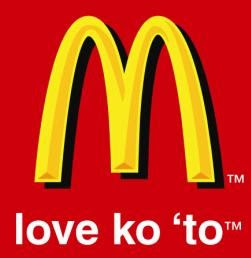I would
always ask my college and graduate students in Anthropology, aside
from learning anthropological concepts and theories inside the
classroom, to explore places, experience cultural
or social happenings, and write ethnographic accounts using the
participation-observation method.
I am posting in my blog with the writer's consent selected
ethnography penned creatively by my students to contribute to the
emerging sub-discipline of anthropology called 'Virtual Ethnography'.
Basically, virtual ethnography is also referred to as Webnography. We
cannot deny the fact that with increasing use of technology and the
Internet, there is now a demand for online spaces on various
ethnographic accounts.
By Jerome B Leano
McDonald’s – dubbed by Time 100 as the Most Important People of the Century. Most definitely, it is one of the most successful and most influential fast food franchise not only in the Philippines, but also in the whole world. One could not separate McDonald's from America - and America from McDonald’s. To learn the American culture, one does not need to go to the United States, or go to museums – as one must simply need to go to Cathedral of Consumption; (Kowinski) McDonald’s to experience the American culture. The term McDonaldization came from Sociologist George Ritzer in his book “The McDonaldization of the Society”, where he defined it as: The process by which the principles of the fast-food restaurant are coming to dominate more and more sectors of American Society as well as of the rest of the world.
With its 31st year on our country, it has definitely influenced the way we think, act, and even culture as a member of the society. Going to McDonald’s was an easy task for me, as these fast foods are located at convenient locations. (malls, highways, bus stops, markets, and etc.) The Golden Arches indicates that you are near the McDonald’s – where an “Open 24 hours” is found, indicating that the place is ready to serve anyone 24/7. Looking deeper, one can say that the “Open 24 hours” indicates importance of the value of time in the American society. Further, Ronald McDonald – the company’s mascot (clown) greets you with a smile, again, indicating that it is happy to serve you (like with any other capitalist companies). Interestingly (most would not notice this), the concept of falling in line, giving your order, taking your meal, looking for a place to eat (where the seats are not ergonomically designed for long term sitting), and leave afterwards is a conditioning process in relation to production. Everything is organized / systematic for the consumers to leave as fast as they can (after eating) and become productive again. (Again, we look at the importance of time).
The food is of course, has been “modified” for the Filipino market. According to my relatives from the United States, the patty, French fries, chicken, and even the softdrinks here is smaller, in terms of quantity, than what they have in the United States. The mashed potato has been changed into rice as the staple for the viand. Mutton burgers in India for cows are holy and are not eaten in India. With these, we can say that McDonald’s can adapt to any culture/place, and it will easily blend in. As the United States has a diverse multi-cultural community.
“Haste makes waste”, as urban legends and myths about McDonald’s food are constantly being shown in the online community and even in movie theaters. And that many criticize fast foods as unhealthy. Nonetheless, the foods were great – and are getting more and more affordable (25php).
Advertising, what better way to promote a product/company, than to create advertisements and commercials that will mark and impose values throughout the world. McDonald’s commercials are easily one of the most catchy and memorable ads (together with Coca-Cola, another American Company). From Karen, to “Gusto ko lang naman ng burger fries eh…” (with its Indian variant). I took the last bite of my Big Mac Value Meal, zipped the monster float and ate the last of my large French fries.
Reference:
Ritzer, George (2008). The McDonaldization of Society. Los Angeles: Pine Forge Press. ISBN 0-7619-8812-2.

No comments:
Post a Comment